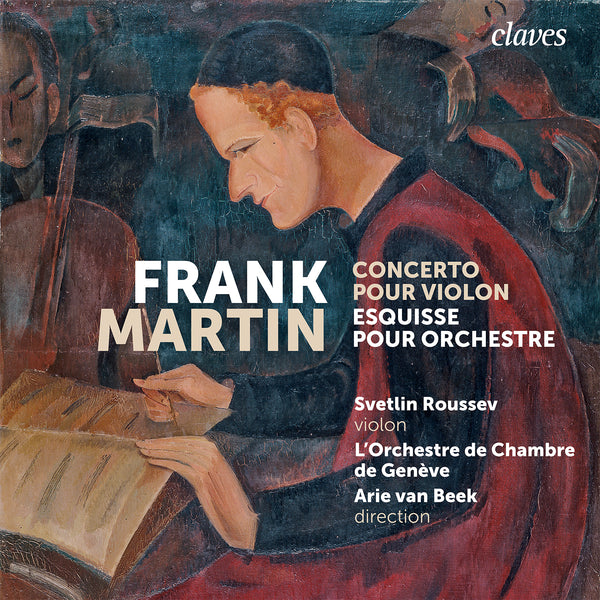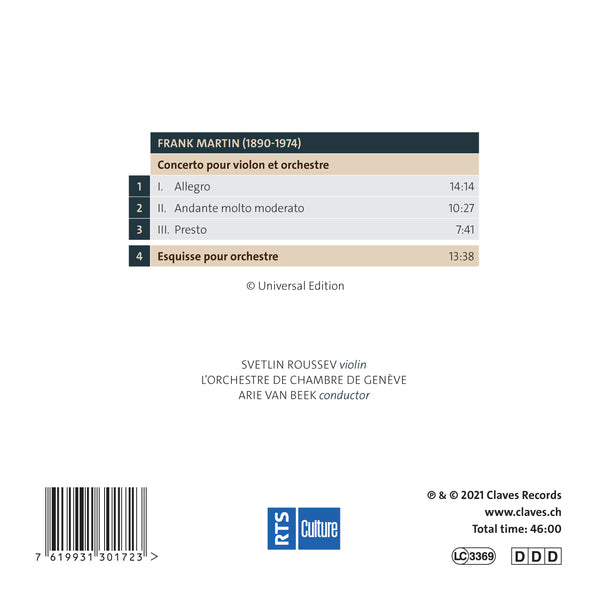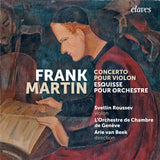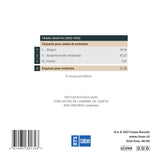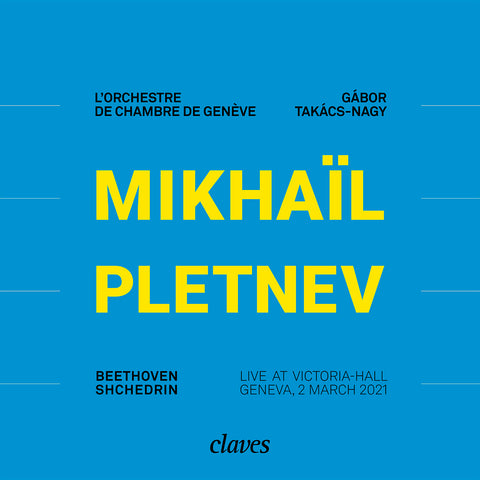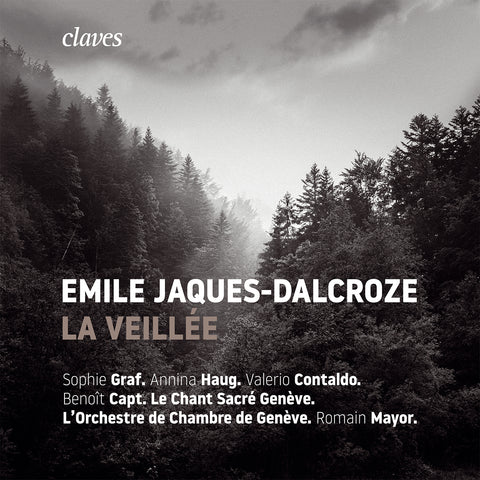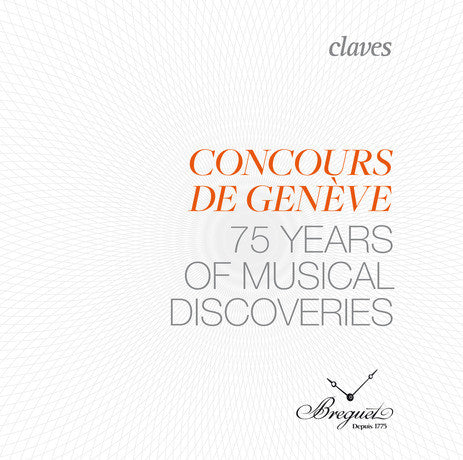(2021) Frank Martin : Concerto pour violon, Esquisse
Category(ies): Concerto Orchestra Rarities
Instrument(s): Violin
Main Composer: Frank Martin
Orchestra: L'Orchestre de Chambre de Genève
Conductor: Arie van Beek
CD set: 1
Catalog N°:
CD 3017
Release: 04.06.2021
EAN/UPC: 7619931301723
This album is now on repressing. Pre-order it at a special price now.
CHF 18.50
This album is no longer available on CD.
This album has not been released yet. Pre-order it from now.
CHF 18.50
This album is no longer available on CD.
CHF 18.50
VAT included for Switzerland & UE
Free shipping
This album is no longer available on CD.
VAT included for Switzerland & UE
Free shipping
This album is now on repressing. Pre-order it at a special price now.
CHF 18.50
This album is no longer available on CD.
This album has not been released yet.
Pre-order it at a special price now.
CHF 18.50
This album is no longer available on CD.
CHF 18.50
This album is no longer available on CD.
FRANK MARTIN : CONCERTO POUR VIOLON, ESQUISSE
FRANK MARTIN (1890-1974): VIOLIN CONCERTO (1950-1951) AND ESQUISSE FOR ORCHESTRA (1920)
Mountain and Sea
“Free man, you will always cherish the sea!” Even Geneva-born Frank Martin (1890-1974), who walked along the Swiss Alps’ rugged paths when he was a young man and tried his hand at rock climbing, didn’t give the lie to the poet Baudelaire! The sea’s infinite horizons gradually became for Frank Martin a compelling need that he satisfied when he was 56. He then settled in Holland, the country of his third wife, Maria Boecke (1915-2017). While taking long walks on the beaches and reconnecting with the feeling of silent plenitude he had already experienced among the high peaks, Frank Martin became convinced that “the mountains are static, whereas the sea has movement, rhythm and unlimited expanse”.
A link between this attraction to the sea and Frank Martin’s interest in William Shakespeare’s The Tempest cannot be excluded. In this drama, the waves and the turbulence they cause when they unleash their power play a crucial role.
Ariel’s spirit
On several occasions, Frank Martin wrote how he had been “haunted” for many years by Shakespeare’s Tempest (see the comments on his own works in Commentaires de Frank Martin sur ses oeuvres, published by La Baconnière, Neuchâtel, 1984). He was fascinated by the variety of the play’s characters and the sea’s constant presence with its immutable rhythm. Frank Martin first implemented his fascination for Shakespeare’s play in Cinq chants d’Ariel. This piece for mixed choir composed in 1950 was followed by the opera Der Sturm, which was premiered at the Vienna Opera in 1955. The “Shakespeare’s Tempest” context also influenced quite naturally Frank Martin’s other compositions of this period, in particular the Violin Concerto.
This piece commissioned by the Pro Helvetia Foundation was composed in 1950-1951 to commemorate the 25th anniversary of the Basel Chamber Orchestra created by Paul Sacher. Frank Martin began writing the work “imbued with the fairy-tale atmosphere” in which Ariel is wrapped. The air spirit is bound to Prospero, Duke of Milan and a magician who controls the natural elements through his knowledge. In this concerto, Frank Martin fully respected the role assigned to this type of composition: “I have indeed endeavoured to write, as far as possible, a true concerto in three distinct parts - Allegro-Andante-Presto - that is a symphonic piece, but led and driven by a solo instrument. It also aims to display the instrument’s qualities and those of the player (op. cit.). Ariel puts in an appearance or shows the tip of his wings several times, “mysteriously far away, at the end of the first movement or at the violin’s entrance in the second movement, or lively and fanciful, like the Finale’s beginning. Yet there is nothing concerted here: I had simply remained a little bewitched by the charms of Prospero’s island” (ibid.).
The charm works from the work’s very first bars, Allegro tranquillo. The diaphanous sonorities prepare the entrance for the soloist, who deploys an intensely lyrical song, followed by a more passionate episode. The development is imbued with this dialectic between passion and spirituality. The dialogue culminates in a dazzling orchestral commentary, like the movement of waves. The flow of sound calms down, and the soloist can then let himself go, alone and magnificently expressive, before launching into a brilliant cadenza. Soloist and orchestra meet up in the coda, a moment full of spirituality and mystery as was the beginning of the work: Ariel, the spirit, is never far away. Calm reigns at the beginning and the end of the second part, Andante molto moderato. A gentle wave-like movement sets in, a delicate oscillation on which orchestra and soloist share an eminently lyrical air.
The orchestra then seems to want to impose its dramatic, almost terrifying statement. However, in the final bars, the solo violin leads to contemplation, floating on a murmur of low strings. The final presto is a masterpiece of instrumentation, an assemblage of colours, in the manner of the marine paintings dating from the Dutch Golden Age. Both the soloist and the orchestra display roaring energy. The brass and the timpani accentuate certain features. It is a game between air and water, between spirit and matter, that concludes in a dazzling light.
Frank Martin’s Violin Concerto was premiered in Basel on 24 January 1952 by violinist Hansheinz Schneeberger and the Basle Chamber Orchestra conducted by Paul Sacher. This great patron of the arts doubled the fee promised by the Pro Helvetia Foundation: an offer not to be refused!
Flashback
In Frank Martin’s youth, Geneva’s musical life was very much oriented towards Germanic music, the works of the great German masters being those that were mainly played. Although Frank Martin, naturally gifted for music, did not follow the official teaching, he studied privately from 1917 onwards with Joseph Lauber (1864-1952), a musician trained at the Zurich Conservatory. Lauber was not indifferent to the novelties brought by French composers at the beginning of the 20th century. He introduced his pupil to the works of César Franck (a Belgian, admittedly!).
For Frank Martin, who had already turned 25 and composed several pieces, this was a revelation. So was the discovery of the music of Debussy, Ravel, Duparc, Fauré, not forgetting Stravinsky, whom Ernest Ansermet – founder of the Orchestre de la Suisse Romande in 1918 – regularly included in his programmes. Frank Martin was bewildered by these harmonic and rhythmic novelties. His quest for a highly personal style and language lasted for some 20 years, until the turn of the 1940s when he composed Le Vin herbé. According to Martin himself, this secular oratorio “was the first important work in which I spoke my own language’. These two decades were nevertheless punctuated by works which all revealed, to varying degrees, many of the composer’s original traits. Some were only modest pieces such as Pavane couleur du temps (1920), others more ambitious works such as La Nique à Satan (1931) or the Symphonie pour grand orchestre (1934).
Esquisse
In this context, the Esquisse for orchestra, composed in 1920 and premiered by Ernest Ansermet at the head of the Orchestre de la Suisse Romande on 30 October of that same year, is of particular interest. The piece was written at a time when the composer was taking leave of the German post-Romantics but had not yet deepened his study of rhythms (it was not until 1926 that he trained at the Jaques-Dalcroze Institute), nor was he tempted by twelve-tone music. Therefore, this Esquisse is a search for colours and atmospheres (the strings are muted throughout the beginning of the work, for example). The use of instruments is traditional: the flute is voluble, the clarinet shimmering, the horn dark.
Through a succession of changes in the tempo, the composer skilfully varies his intention (Andante con moto - Allegretto giocoso - Adagio - Allegro giocoso - Tempo tranquillo - A tempo con malinconia - etc.). The various motives are brief, almost sketched out and precise. The climax of this short piece comes in a Tempo di valsa con fuoco: the orchestra can then go wild, not without a touch of humour and some surprises (numerous changes of time signature), before the lanterns gradually go out, leaving only two horns to hold a final octave perdendosi...
Frank Martin does not seem to have attached any particular importance to this work, which demonstrates, if anything, the severity with which he considered his creations. But this Esquisse indeed reveals a strong point of his personality: Frank Martin had the nature of a poet!
Georges Schürch
Translation: Michelle Bulloch – MUSITEXT
***
SVETLIN ROUSSEV violin
Since winning the first prize at the widely acclaimed first Sendai International Competition in May 2001, the charismatic violin virtuoso Svetlin Roussev enjoys a prestigious international career in many of the world’s major concert halls, including the Bolshoi Theatre and Tchaikovsky Hall in Moscow, Suntory Hall in Tokyo, Seoul Arts Center, UNESCO, Théâtre des Champs-Elysées, Frankfurt’s Alte Oper, Konzerhaus in Berlin and Palais of the United Nations in Geneva.
Roussev is a regular guest soloist with various orchestras in the USA, Latin America, Asia and Europe. He has performed under the baton of conductors such as Myung-Whun Chung, Léon Fleisher, Yehudi Menuhin, Yuzo Toyama, Marek Janowski, Emmanuel Krivine, François-Xavier Roth and Jean-Jacques Kantorow.
He has been leading and conducting various ensembles and orchestras in Bulgaria, France, Poland, Korea, Japan and Sweden.
With remarkable virtuosity and intensity, Svetlin performs a broad repertoire ranging from the baroque to the contemporary. He is renowned for his renditions of Slavic compositions and keenly promotes Bulgarian music. Acclaimed Bulgarian Musician of the Year in 2006, his home country honoured him again in 2007, 2016 and 2019 with the Cristal Lyra distinction awarded by the Ministry of Culture. In 2018, Svetlin Roussev became an Honorary Citizen of his hometown Ruse, along with the Nobel Prize of literature Elias Canetti.
Svetlin Roussev’s CD recordings include works by Vladigerov, Sibelius, Hartmann, Grieg, Medtner, Dvorak, Mendelssohn, Lalo, Ravel, Ysaÿe for the labels Ambroisie, Integral, Fondamenta, Decca, Arcantus and YESM & ARTS.
Roussev is a violin professor at the prestigious Haute école de musique in Geneva after 10 years being a professor at the CNSMDP in Paris. He has been giving violin and chamber music masterclasses around the world. He is also the artistic advisor and artist in residence of the March Music Days International Festival in his hometown Ruse after serving as artistic director and artist in residence of the Sofia Philharmonic Orchestra.
Svetlin Roussev has won numerous prizes at many international competitions, including Indianapolis, Long-Thibaud and Melbourne. He began his musical education in his home town of Ruse, Bulgaria, with his mother. At the age of 15, he was accepted into the CNSMD where he studied with Gérard Poulet, Devy Erlih and Jean-Jacques Kantorow. Three years later, the jury unanimously awarded him the first prize for violin and chamber music. Subsequently he entered the postgraduate program.
Svetlin Roussev performs on the Stradivarius 1710 Camposelice, a violin kindly loaned by the Nippon Music Foundation.
REVIEWS
« [..] La première trace du soliste a la forme d’un disque gravé pour le compte du label romand Claves. Il a été conçu aux côtés de l’Orchestre de chambre de Genève, dirigé par Arie van Beek, «un ami de longue date, avec qui j’ai travaillé durant des années alors que j’étais premier violon solo à l’Orchestre d’Auvergne où il était directeur musical.» L’album met les projecteurs sur une oeuvre qu’il faut redécouvrir, le trop rare «Concerto pour violon» de Frank Martin. Une pièce contrastée, sombre et éclatante à la fois, dont on retrouve ici toute la richesse sous un archet racé et subtil. Le Stradivarius «Camposelice» de 1710 émerveille dans chaque passage de la pièce. » - Rocco Zacheo, juillet 2021
« Svetlin Roussev vient de quitter son poste de Konzertmeister à l’Orchestre de la Suisse Romande pour retrouver une carrière de concertiste trop longtemps différée. Quittant la Suisse, il adresse ici en quelque sorte un cadeau de remerciement aux mélomanes helvètes en gravant une version inspirée, lyrique, admirablement jouée, réunissant clarté formelle du discours – la cadence de l’Allegro qui s’appuie sur le violon polyphonique inventé par Bach – et fluidité improvisée du jeu. [..] L’œuvre est d’une beauté crépusculaire inouïe, je ne me suis jamais expliqué qu’elle soit si peu courue, au concert comme au disque, alors qu’elle s’inscrit au panthéon des concertos pour violon du XXe siècle, je crois bien que cette fois elle a trouvé sa version de référence. [..] » - Jean-Charles Hoffelé, août 2021
« [..] Fluide et fantasque, réservant à la voix soliste du violon un chant lyrique intense et à l'orchestre des épisodes énergiques, parfois motoriques et très colorés, la pièce se démarque et d'un ton bien moins grave et triste que le Concerto pour violoncelle. Le mouvement lent évoque cependant, par ses thèmes s'étirant dans des mondes harmoniquement incertains, les épisodes méditatifs de la dernière cantate Et la Vie l'emporta de 1974. Le soliste Svetlin Roussev investit les climats variés de l'oeuvre avec intensité, colorant son jeu, jouant du vibrato avec soin, domptant les lignes de force du concerto. L’accompagnement orchestral est lumineux, souple, attentif. La direction d'Arie van Beek explore des nuances très fines et veille à maintenir un équilibre qui laisse toujours la prévalence au soliste, élimant cependant quelques phrasés orchestraux que l'on pourrait imaginer plus intensément appuyés, plus chevillés. [..] » - Bernard Halter, avril 2021
« [..] Das Genfer Kammerorchester unter Arie van Beek und der bulga-rische Solist Svetlin Roussev treten hierbei in einen sehr gut ausbalancierten Dialog, der fernab von auftrumpfender Virtuosität oder orchestralem Pathos am besten mit kontrollierter Schönheit und rationaler Sinnlichkeit zu beschreiben wäre. Im Finalsatz werden im Übrigen noch einmal die Koordinaten hörbar, zwischen denen Martins Musik aufgespannt ist: Erinnert das Kopfmotiv mit seinem Quartaufstieg an Schönbergs 1. Kammersinfonie, so erscheinen in der neoklassizistischen Motorik zuweilen Strawinsky’sche Anklänge, aber auch Gesten, die beispielsweise an César Franck denken lassen. [..] » - Dezember 2021
« [..] Formé par Gérard Poulet, Devy Erlih et Jean-Jacques Kantorow, devenu lui-même un professeur recherché, Svetlin Roussev fut le premier violon solo du Philharmonique de Radio France durant douze ans, poste qu'il occupe désormais à L'Orchestre de la Suisse romande. Sa vision de l'œuvre, à la fois lumineuse, agile et colorée, bénéficie d'une prise de son analytique, qui fait apparaître un équilibre entre le soliste et l'orchestre particulièrement soigné. Roussev domine le discours par son lyrisme serein, exploitant, notamment dans la cadence, la généreuse palette d'un Stradivarius de 1710. Dans le finale, le tumultueux dialogue entre le violon, les bois, cuivres et timbales, rendu avec magnificence, signe une nouvelle référence moderne. [..] » - Jean-Michel Molkhou, juillet 2021
« [..] Svetlin Roussev vermag diese Melodik durchaus „beseelt“ ohne Sentimentalitat auszuspielen, sehr aufmerksam und stimmungsvoll-feinfuhlig begleitet vom Orchester unter Arie van Beek - kurz: eine gelungene Werbung fur diese Komposition. [..] » - Giselher Schubert, Oktober 2022
“[..] Having recorded concertos by Hartmann and Vladigerov, Svetlin Roussev is clearly drawn to the less familiar. His perceptive account is more flexible than Wolfgang Schneiderhan and more involving than Baiba Skride, technically excellent though these both are. [..]” - Richard Whitehouse, October 2022
« [..] Ici, l’orchestre restitue à merveille ces diverses influences. Le concerto pour violon apparaît ainsi comme un fil tendu au-dessus d’un rêve sur lequel court avec agilité et brio l’archet de Svetlin Roussev, violoniste bulgare et ancien élève de Jean-Jacques Kantorow. Il est parfaitement secondé par l’orchestre de chambre de Genève sous la direction d’un Arie van Beek qui poursuit son exploration de l’œuvre de Frank Martin et lui redonne, avec cet enregistrement associant légèreté et lyrisme, toutes ses lettres de noblesse. » - Laurent Pfaadt, novembre 2021
« Frank Martin (1890–1974) darf man getrost als einen der bekanntesten Schweizer Komponisten der zweiten Hälfte des 20. Jahrhunderts bezeichnen. Das Label Claves setzt sich seit mehr als dreißig Jahren für sein Schaffen ein und hat unter anderem auch historische Liedaufnahmen mit Martin am Klavier veröffentlicht. Die Uraufführung des Violinkonzerts hatte 1952 Hansheinz Schneeberger gespielt, der Live-Mitschnitt liegt seit einigen Jahren auf dem Markt vor. [..] » - Dr. Jürgen Schaarwächter, November 2022
« [..] Une fascination qui a trouvé des réminiscences en musique (particulièrement dans l’Andante central). C’est le violoniste Svetlin Roussev, par ailleurs premier violon solo de l’OSR, qui donne du souffle à cette partition lyrique, parfois tempétueuse de 1950-1951, où Frank Martin est sûr de son art, ayant dépassé les différentes influences sur son parcours et assimilé les recherches de son temps sans renoncer à la tonalité. En complément, l’Esquisse pour orchestre de 1920 est plus légère et parfois carrément sautillante, dans la version de l’Orchestre de chambre de Genève sous la direction d’Arie van Beek. » - Elisabeth Hass, mai 2021
“[..] The release under review, however, is most welcome and all fans of Frank Martin's music will be made happy by the inclusion of a somewhat early piece for small orchestra to which the composer does not seem to have attached any particular attention and which thus remained collecting dust either on the composer's shelves or in one long-forgotten drawer. The Esquisse pour orchestre was completed in 1920 and first performed soon afterwards by Ernest Ansermet. [..] Both works recorded here receive superb performances and Svetlin Roussev has the full measure of the exacting violin part, clearly possessing the technique and the musicality to do such heart-warming music proud. [..]” - Hubert Culot, July 2021
« [..] Der bulgarische Geiger Svetlin Roussev - Professor in Genf - setzt sich hier sowohl mit beeindruckender Virtuosen-Attitüde wie mit geigerischer Geläufigkeit und klangsinnlicher Sensibilität für dieses Werk ein. Die noch grössere Entdeckung dieser mit blass 46 Minuten etwas gar kurz geratenen CD aber ist ein Orchesterwerk, das der junge Frank Martin im Alter von 29 Jahren komponierte: «Esquisse», eine überaus gut gelaunte Orchester-Etüde voller übersprudelnder Einfälle, munterer Rhythmen, neckischer Taktwechsel und einem burlesken Geist, den die Musiker des Genfer Kammerorchesters unter der Leitung von Arie van Beek mit sehr viel Charme und Humor einfangen. » - Reinmar Wagner, août 2021
« Als der volltönende Avantgardist seiner Zeit hat der Genfer Komponist Frank Martin sich nicht aufgestellt. Immerhin sind seiner Musik serielle Elemente eingearbeitet. Dergestalt entsteht in den sensiblen, feinfühligen, auch melodiösen Texturen ein Klangkosmos der völlig unverwechselbaren Charakteristik. Das Schweizer Label claves hat jetzt eine Aufnahme des Concerto pour Violon sowie von Esquisse pour Orchestre veröffentlicht mit dem Genfer Kammerorchester, dem Geiger Svetlin Roussev und dem Dirigenten Arie van Beek. [..] Das An-und-Durchhören lohnt sich. » - Wolf Loeckle, Juli 2021
“[..] Bulgarian violinist Svetlin Roussev proves to be an excellent advocate for Martin's Violin Concerto. He knows how to beautifully highlight its ingenious as well as special character, his playing is contrasting and passionate, but also internalized, the structure broad but exciting, tone production, articulation and phrasing testifying to achieved mastery, more classical and cool than somptuously romantic. These are the typical qualities with which the work is best served. Spontaneity and suppleness go hand in hand, on the one hand he shows himself to be prosaic and vulnerable, on the other hand energetic and penetrating. [..]” - Aart van der Wal, Juli 2021
“[..] The soloist Svetlin Roussev succeeds convincingly in shaping the combination of impressionism and twelve-tone music that Martin has harnessed in a very free, personal way. The Bulgarian violinist knows how to conquer the moving music with both a soloistic gesture and a sure feeling for the moods of the work. In the Geneva Chamber Orchestra, he has found accompanists who present the multi-faceted music with a loosely buoyant spirit. In the Sketch, also conducted by Arie van Beeck, they act a bit more briskly and compactly. But that also fits the younger music overflowing with ideas.” - Uwe Krusch, May 2021
“[..] They were joined by Bulgarian virtuoso Svetlin Roussev to perform the solo part of the Violin Concerto, written in 1951. What an interesting, profound and beautiful piece! In the general consciousness of music lovers and, even more so, of the musicians themselves, there are only a few dozen exceptional pieces of this kind created in the 20th century, to mention names such as Karol Szymanowski, Dmitri Shostakovich, Sergei Prokofiev, Béla Bartók, Carl Nielsen, Edward Elgar or Benjamin Britten, while a pearl of the violin repertoire such as Frank Martin's piece is still waiting, for one reason or another, for proper international recognition and popularity. I think that any music lover who has the opportunity to hear the recommended recording will share my admiration, especially as the performance is superb and captivating. [..]” - Paweł Chmielowski, September 2023
"[..] The interpretation is superb and Roussev and The Geneva Chamber Orchestra conducted by Arie van Beek are as one. The soloist’s sound is warm and attractive; the intonation is very pure and the recorded sound is finely integrated. The orchestral solos are sensitive and colourful whether in the woodwind or brass. The minor 2nd and the augmented 2nd feature prominently throughout the opening Allegro tranquillo (the word tranquillo is missing on the back page summary of the disc) and the cadenza is brilliantly and musically played by Roussev. The introduction to the middle movement is very sombre but the solo violin weaves an ethereal line above the hesitant phrases of the strings. The Finale is a mad gallop to the finish. [..]" - Andrew Lorenz, October 2021
FRANK MARTIN (1890-1974): VIOLIN CONCERTO (1950-1951) AND ESQUISSE FOR ORCHESTRA (1920)
Mountain and Sea
“Free man, you will always cherish the sea!” Even Geneva-born Frank Martin (1890-1974), who walked along the Swiss Alps’ rugged paths when he was a young man and tried his hand at rock climbing, didn’t give the lie to the poet Baudelaire! The sea’s infinite horizons gradually became for Frank Martin a compelling need that he satisfied when he was 56. He then settled in Holland, the country of his third wife, Maria Boecke (1915-2017). While taking long walks on the beaches and reconnecting with the feeling of silent plenitude he had already experienced among the high peaks, Frank Martin became convinced that “the mountains are static, whereas the sea has movement, rhythm and unlimited expanse”.
A link between this attraction to the sea and Frank Martin’s interest in William Shakespeare’s The Tempest cannot be excluded. In this drama, the waves and the turbulence they cause when they unleash their power play a crucial role.
Ariel’s spirit
On several occasions, Frank Martin wrote how he had been “haunted” for many years by Shakespeare’s Tempest (see the comments on his own works in Commentaires de Frank Martin sur ses oeuvres, published by La Baconnière, Neuchâtel, 1984). He was fascinated by the variety of the play’s characters and the sea’s constant presence with its immutable rhythm. Frank Martin first implemented his fascination for Shakespeare’s play in Cinq chants d’Ariel. This piece for mixed choir composed in 1950 was followed by the opera Der Sturm, which was premiered at the Vienna Opera in 1955. The “Shakespeare’s Tempest” context also influenced quite naturally Frank Martin’s other compositions of this period, in particular the Violin Concerto.
This piece commissioned by the Pro Helvetia Foundation was composed in 1950-1951 to commemorate the 25th anniversary of the Basel Chamber Orchestra created by Paul Sacher. Frank Martin began writing the work “imbued with the fairy-tale atmosphere” in which Ariel is wrapped. The air spirit is bound to Prospero, Duke of Milan and a magician who controls the natural elements through his knowledge. In this concerto, Frank Martin fully respected the role assigned to this type of composition: “I have indeed endeavoured to write, as far as possible, a true concerto in three distinct parts - Allegro-Andante-Presto - that is a symphonic piece, but led and driven by a solo instrument. It also aims to display the instrument’s qualities and those of the player (op. cit.). Ariel puts in an appearance or shows the tip of his wings several times, “mysteriously far away, at the end of the first movement or at the violin’s entrance in the second movement, or lively and fanciful, like the Finale’s beginning. Yet there is nothing concerted here: I had simply remained a little bewitched by the charms of Prospero’s island” (ibid.).
The charm works from the work’s very first bars, Allegro tranquillo. The diaphanous sonorities prepare the entrance for the soloist, who deploys an intensely lyrical song, followed by a more passionate episode. The development is imbued with this dialectic between passion and spirituality. The dialogue culminates in a dazzling orchestral commentary, like the movement of waves. The flow of sound calms down, and the soloist can then let himself go, alone and magnificently expressive, before launching into a brilliant cadenza. Soloist and orchestra meet up in the coda, a moment full of spirituality and mystery as was the beginning of the work: Ariel, the spirit, is never far away. Calm reigns at the beginning and the end of the second part, Andante molto moderato. A gentle wave-like movement sets in, a delicate oscillation on which orchestra and soloist share an eminently lyrical air.
The orchestra then seems to want to impose its dramatic, almost terrifying statement. However, in the final bars, the solo violin leads to contemplation, floating on a murmur of low strings. The final presto is a masterpiece of instrumentation, an assemblage of colours, in the manner of the marine paintings dating from the Dutch Golden Age. Both the soloist and the orchestra display roaring energy. The brass and the timpani accentuate certain features. It is a game between air and water, between spirit and matter, that concludes in a dazzling light.
Frank Martin’s Violin Concerto was premiered in Basel on 24 January 1952 by violinist Hansheinz Schneeberger and the Basle Chamber Orchestra conducted by Paul Sacher. This great patron of the arts doubled the fee promised by the Pro Helvetia Foundation: an offer not to be refused!
Flashback
In Frank Martin’s youth, Geneva’s musical life was very much oriented towards Germanic music, the works of the great German masters being those that were mainly played. Although Frank Martin, naturally gifted for music, did not follow the official teaching, he studied privately from 1917 onwards with Joseph Lauber (1864-1952), a musician trained at the Zurich Conservatory. Lauber was not indifferent to the novelties brought by French composers at the beginning of the 20th century. He introduced his pupil to the works of César Franck (a Belgian, admittedly!).
For Frank Martin, who had already turned 25 and composed several pieces, this was a revelation. So was the discovery of the music of Debussy, Ravel, Duparc, Fauré, not forgetting Stravinsky, whom Ernest Ansermet – founder of the Orchestre de la Suisse Romande in 1918 – regularly included in his programmes. Frank Martin was bewildered by these harmonic and rhythmic novelties. His quest for a highly personal style and language lasted for some 20 years, until the turn of the 1940s when he composed Le Vin herbé. According to Martin himself, this secular oratorio “was the first important work in which I spoke my own language’. These two decades were nevertheless punctuated by works which all revealed, to varying degrees, many of the composer’s original traits. Some were only modest pieces such as Pavane couleur du temps (1920), others more ambitious works such as La Nique à Satan (1931) or the Symphonie pour grand orchestre (1934).
Esquisse
In this context, the Esquisse for orchestra, composed in 1920 and premiered by Ernest Ansermet at the head of the Orchestre de la Suisse Romande on 30 October of that same year, is of particular interest. The piece was written at a time when the composer was taking leave of the German post-Romantics but had not yet deepened his study of rhythms (it was not until 1926 that he trained at the Jaques-Dalcroze Institute), nor was he tempted by twelve-tone music. Therefore, this Esquisse is a search for colours and atmospheres (the strings are muted throughout the beginning of the work, for example). The use of instruments is traditional: the flute is voluble, the clarinet shimmering, the horn dark.
Through a succession of changes in the tempo, the composer skilfully varies his intention (Andante con moto - Allegretto giocoso - Adagio - Allegro giocoso - Tempo tranquillo - A tempo con malinconia - etc.). The various motives are brief, almost sketched out and precise. The climax of this short piece comes in a Tempo di valsa con fuoco: the orchestra can then go wild, not without a touch of humour and some surprises (numerous changes of time signature), before the lanterns gradually go out, leaving only two horns to hold a final octave perdendosi...
Frank Martin does not seem to have attached any particular importance to this work, which demonstrates, if anything, the severity with which he considered his creations. But this Esquisse indeed reveals a strong point of his personality: Frank Martin had the nature of a poet!
Georges Schürch
Translation: Michelle Bulloch – MUSITEXT
***
SVETLIN ROUSSEV violin
Since winning the first prize at the widely acclaimed first Sendai International Competition in May 2001, the charismatic violin virtuoso Svetlin Roussev enjoys a prestigious international career in many of the world’s major concert halls, including the Bolshoi Theatre and Tchaikovsky Hall in Moscow, Suntory Hall in Tokyo, Seoul Arts Center, UNESCO, Théâtre des Champs-Elysées, Frankfurt’s Alte Oper, Konzerhaus in Berlin and Palais of the United Nations in Geneva.
Roussev is a regular guest soloist with various orchestras in the USA, Latin America, Asia and Europe. He has performed under the baton of conductors such as Myung-Whun Chung, Léon Fleisher, Yehudi Menuhin, Yuzo Toyama, Marek Janowski, Emmanuel Krivine, François-Xavier Roth and Jean-Jacques Kantorow.
He has been leading and conducting various ensembles and orchestras in Bulgaria, France, Poland, Korea, Japan and Sweden.
With remarkable virtuosity and intensity, Svetlin performs a broad repertoire ranging from the baroque to the contemporary. He is renowned for his renditions of Slavic compositions and keenly promotes Bulgarian music. Acclaimed Bulgarian Musician of the Year in 2006, his home country honoured him again in 2007, 2016 and 2019 with the Cristal Lyra distinction awarded by the Ministry of Culture. In 2018, Svetlin Roussev became an Honorary Citizen of his hometown Ruse, along with the Nobel Prize of literature Elias Canetti.
Svetlin Roussev’s CD recordings include works by Vladigerov, Sibelius, Hartmann, Grieg, Medtner, Dvorak, Mendelssohn, Lalo, Ravel, Ysaÿe for the labels Ambroisie, Integral, Fondamenta, Decca, Arcantus and YESM & ARTS.
Roussev is a violin professor at the prestigious Haute école de musique in Geneva after 10 years being a professor at the CNSMDP in Paris. He has been giving violin and chamber music masterclasses around the world. He is also the artistic advisor and artist in residence of the March Music Days International Festival in his hometown Ruse after serving as artistic director and artist in residence of the Sofia Philharmonic Orchestra.
Svetlin Roussev has won numerous prizes at many international competitions, including Indianapolis, Long-Thibaud and Melbourne. He began his musical education in his home town of Ruse, Bulgaria, with his mother. At the age of 15, he was accepted into the CNSMD where he studied with Gérard Poulet, Devy Erlih and Jean-Jacques Kantorow. Three years later, the jury unanimously awarded him the first prize for violin and chamber music. Subsequently he entered the postgraduate program.
Svetlin Roussev performs on the Stradivarius 1710 Camposelice, a violin kindly loaned by the Nippon Music Foundation.
REVIEWS
« [..] La première trace du soliste a la forme d’un disque gravé pour le compte du label romand Claves. Il a été conçu aux côtés de l’Orchestre de chambre de Genève, dirigé par Arie van Beek, «un ami de longue date, avec qui j’ai travaillé durant des années alors que j’étais premier violon solo à l’Orchestre d’Auvergne où il était directeur musical.» L’album met les projecteurs sur une oeuvre qu’il faut redécouvrir, le trop rare «Concerto pour violon» de Frank Martin. Une pièce contrastée, sombre et éclatante à la fois, dont on retrouve ici toute la richesse sous un archet racé et subtil. Le Stradivarius «Camposelice» de 1710 émerveille dans chaque passage de la pièce. » - Rocco Zacheo, juillet 2021
« Svetlin Roussev vient de quitter son poste de Konzertmeister à l’Orchestre de la Suisse Romande pour retrouver une carrière de concertiste trop longtemps différée. Quittant la Suisse, il adresse ici en quelque sorte un cadeau de remerciement aux mélomanes helvètes en gravant une version inspirée, lyrique, admirablement jouée, réunissant clarté formelle du discours – la cadence de l’Allegro qui s’appuie sur le violon polyphonique inventé par Bach – et fluidité improvisée du jeu. [..] L’œuvre est d’une beauté crépusculaire inouïe, je ne me suis jamais expliqué qu’elle soit si peu courue, au concert comme au disque, alors qu’elle s’inscrit au panthéon des concertos pour violon du XXe siècle, je crois bien que cette fois elle a trouvé sa version de référence. [..] » - Jean-Charles Hoffelé, août 2021
« [..] Fluide et fantasque, réservant à la voix soliste du violon un chant lyrique intense et à l'orchestre des épisodes énergiques, parfois motoriques et très colorés, la pièce se démarque et d'un ton bien moins grave et triste que le Concerto pour violoncelle. Le mouvement lent évoque cependant, par ses thèmes s'étirant dans des mondes harmoniquement incertains, les épisodes méditatifs de la dernière cantate Et la Vie l'emporta de 1974. Le soliste Svetlin Roussev investit les climats variés de l'oeuvre avec intensité, colorant son jeu, jouant du vibrato avec soin, domptant les lignes de force du concerto. L’accompagnement orchestral est lumineux, souple, attentif. La direction d'Arie van Beek explore des nuances très fines et veille à maintenir un équilibre qui laisse toujours la prévalence au soliste, élimant cependant quelques phrasés orchestraux que l'on pourrait imaginer plus intensément appuyés, plus chevillés. [..] » - Bernard Halter, avril 2021
« [..] Das Genfer Kammerorchester unter Arie van Beek und der bulga-rische Solist Svetlin Roussev treten hierbei in einen sehr gut ausbalancierten Dialog, der fernab von auftrumpfender Virtuosität oder orchestralem Pathos am besten mit kontrollierter Schönheit und rationaler Sinnlichkeit zu beschreiben wäre. Im Finalsatz werden im Übrigen noch einmal die Koordinaten hörbar, zwischen denen Martins Musik aufgespannt ist: Erinnert das Kopfmotiv mit seinem Quartaufstieg an Schönbergs 1. Kammersinfonie, so erscheinen in der neoklassizistischen Motorik zuweilen Strawinsky’sche Anklänge, aber auch Gesten, die beispielsweise an César Franck denken lassen. [..] » - Dezember 2021
« [..] Formé par Gérard Poulet, Devy Erlih et Jean-Jacques Kantorow, devenu lui-même un professeur recherché, Svetlin Roussev fut le premier violon solo du Philharmonique de Radio France durant douze ans, poste qu'il occupe désormais à L'Orchestre de la Suisse romande. Sa vision de l'œuvre, à la fois lumineuse, agile et colorée, bénéficie d'une prise de son analytique, qui fait apparaître un équilibre entre le soliste et l'orchestre particulièrement soigné. Roussev domine le discours par son lyrisme serein, exploitant, notamment dans la cadence, la généreuse palette d'un Stradivarius de 1710. Dans le finale, le tumultueux dialogue entre le violon, les bois, cuivres et timbales, rendu avec magnificence, signe une nouvelle référence moderne. [..] » - Jean-Michel Molkhou, juillet 2021
« [..] Svetlin Roussev vermag diese Melodik durchaus „beseelt“ ohne Sentimentalitat auszuspielen, sehr aufmerksam und stimmungsvoll-feinfuhlig begleitet vom Orchester unter Arie van Beek - kurz: eine gelungene Werbung fur diese Komposition. [..] » - Giselher Schubert, Oktober 2022
“[..] Having recorded concertos by Hartmann and Vladigerov, Svetlin Roussev is clearly drawn to the less familiar. His perceptive account is more flexible than Wolfgang Schneiderhan and more involving than Baiba Skride, technically excellent though these both are. [..]” - Richard Whitehouse, October 2022
« [..] Ici, l’orchestre restitue à merveille ces diverses influences. Le concerto pour violon apparaît ainsi comme un fil tendu au-dessus d’un rêve sur lequel court avec agilité et brio l’archet de Svetlin Roussev, violoniste bulgare et ancien élève de Jean-Jacques Kantorow. Il est parfaitement secondé par l’orchestre de chambre de Genève sous la direction d’un Arie van Beek qui poursuit son exploration de l’œuvre de Frank Martin et lui redonne, avec cet enregistrement associant légèreté et lyrisme, toutes ses lettres de noblesse. » - Laurent Pfaadt, novembre 2021
« Frank Martin (1890–1974) darf man getrost als einen der bekanntesten Schweizer Komponisten der zweiten Hälfte des 20. Jahrhunderts bezeichnen. Das Label Claves setzt sich seit mehr als dreißig Jahren für sein Schaffen ein und hat unter anderem auch historische Liedaufnahmen mit Martin am Klavier veröffentlicht. Die Uraufführung des Violinkonzerts hatte 1952 Hansheinz Schneeberger gespielt, der Live-Mitschnitt liegt seit einigen Jahren auf dem Markt vor. [..] » - Dr. Jürgen Schaarwächter, November 2022
« [..] Une fascination qui a trouvé des réminiscences en musique (particulièrement dans l’Andante central). C’est le violoniste Svetlin Roussev, par ailleurs premier violon solo de l’OSR, qui donne du souffle à cette partition lyrique, parfois tempétueuse de 1950-1951, où Frank Martin est sûr de son art, ayant dépassé les différentes influences sur son parcours et assimilé les recherches de son temps sans renoncer à la tonalité. En complément, l’Esquisse pour orchestre de 1920 est plus légère et parfois carrément sautillante, dans la version de l’Orchestre de chambre de Genève sous la direction d’Arie van Beek. » - Elisabeth Hass, mai 2021
“[..] The release under review, however, is most welcome and all fans of Frank Martin's music will be made happy by the inclusion of a somewhat early piece for small orchestra to which the composer does not seem to have attached any particular attention and which thus remained collecting dust either on the composer's shelves or in one long-forgotten drawer. The Esquisse pour orchestre was completed in 1920 and first performed soon afterwards by Ernest Ansermet. [..] Both works recorded here receive superb performances and Svetlin Roussev has the full measure of the exacting violin part, clearly possessing the technique and the musicality to do such heart-warming music proud. [..]” - Hubert Culot, July 2021
« [..] Der bulgarische Geiger Svetlin Roussev - Professor in Genf - setzt sich hier sowohl mit beeindruckender Virtuosen-Attitüde wie mit geigerischer Geläufigkeit und klangsinnlicher Sensibilität für dieses Werk ein. Die noch grössere Entdeckung dieser mit blass 46 Minuten etwas gar kurz geratenen CD aber ist ein Orchesterwerk, das der junge Frank Martin im Alter von 29 Jahren komponierte: «Esquisse», eine überaus gut gelaunte Orchester-Etüde voller übersprudelnder Einfälle, munterer Rhythmen, neckischer Taktwechsel und einem burlesken Geist, den die Musiker des Genfer Kammerorchesters unter der Leitung von Arie van Beek mit sehr viel Charme und Humor einfangen. » - Reinmar Wagner, août 2021
« Als der volltönende Avantgardist seiner Zeit hat der Genfer Komponist Frank Martin sich nicht aufgestellt. Immerhin sind seiner Musik serielle Elemente eingearbeitet. Dergestalt entsteht in den sensiblen, feinfühligen, auch melodiösen Texturen ein Klangkosmos der völlig unverwechselbaren Charakteristik. Das Schweizer Label claves hat jetzt eine Aufnahme des Concerto pour Violon sowie von Esquisse pour Orchestre veröffentlicht mit dem Genfer Kammerorchester, dem Geiger Svetlin Roussev und dem Dirigenten Arie van Beek. [..] Das An-und-Durchhören lohnt sich. » - Wolf Loeckle, Juli 2021
“[..] Bulgarian violinist Svetlin Roussev proves to be an excellent advocate for Martin's Violin Concerto. He knows how to beautifully highlight its ingenious as well as special character, his playing is contrasting and passionate, but also internalized, the structure broad but exciting, tone production, articulation and phrasing testifying to achieved mastery, more classical and cool than somptuously romantic. These are the typical qualities with which the work is best served. Spontaneity and suppleness go hand in hand, on the one hand he shows himself to be prosaic and vulnerable, on the other hand energetic and penetrating. [..]” - Aart van der Wal, Juli 2021
“[..] The soloist Svetlin Roussev succeeds convincingly in shaping the combination of impressionism and twelve-tone music that Martin has harnessed in a very free, personal way. The Bulgarian violinist knows how to conquer the moving music with both a soloistic gesture and a sure feeling for the moods of the work. In the Geneva Chamber Orchestra, he has found accompanists who present the multi-faceted music with a loosely buoyant spirit. In the Sketch, also conducted by Arie van Beeck, they act a bit more briskly and compactly. But that also fits the younger music overflowing with ideas.” - Uwe Krusch, May 2021
“[..] They were joined by Bulgarian virtuoso Svetlin Roussev to perform the solo part of the Violin Concerto, written in 1951. What an interesting, profound and beautiful piece! In the general consciousness of music lovers and, even more so, of the musicians themselves, there are only a few dozen exceptional pieces of this kind created in the 20th century, to mention names such as Karol Szymanowski, Dmitri Shostakovich, Sergei Prokofiev, Béla Bartók, Carl Nielsen, Edward Elgar or Benjamin Britten, while a pearl of the violin repertoire such as Frank Martin's piece is still waiting, for one reason or another, for proper international recognition and popularity. I think that any music lover who has the opportunity to hear the recommended recording will share my admiration, especially as the performance is superb and captivating. [..]” - Paweł Chmielowski, September 2023
"[..] The interpretation is superb and Roussev and The Geneva Chamber Orchestra conducted by Arie van Beek are as one. The soloist’s sound is warm and attractive; the intonation is very pure and the recorded sound is finely integrated. The orchestral solos are sensitive and colourful whether in the woodwind or brass. The minor 2nd and the augmented 2nd feature prominently throughout the opening Allegro tranquillo (the word tranquillo is missing on the back page summary of the disc) and the cadenza is brilliantly and musically played by Roussev. The introduction to the middle movement is very sombre but the solo violin weaves an ethereal line above the hesitant phrases of the strings. The Finale is a mad gallop to the finish. [..]" - Andrew Lorenz, October 2021
Return to the album | Read the booklet | Composer(s): Frank Martin | Main Artist: Svetlin Roussev






